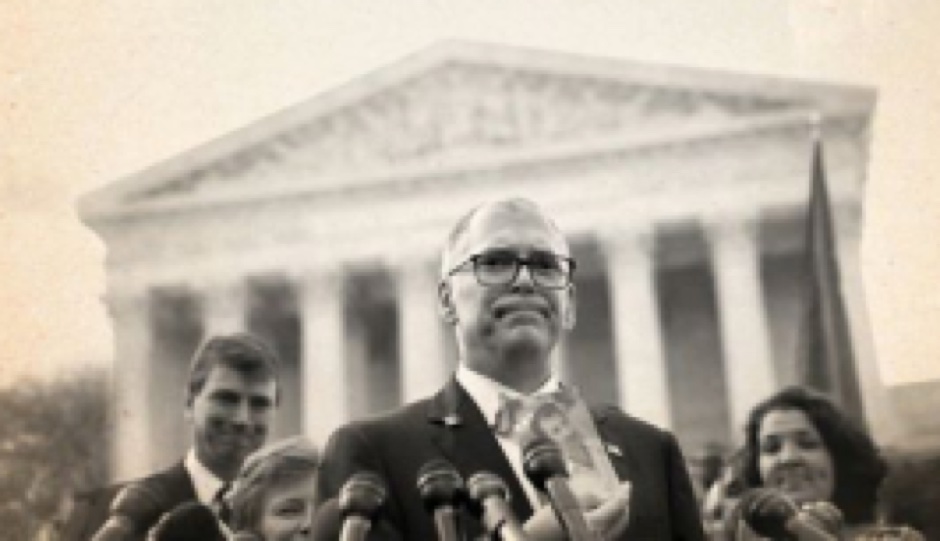BOOK REVIEW: Love Wins Is a Historical Artifact in Its Own Right

“Love Wins” cover art.
Today marks the first day of LGBT Pride Month. And later this month comes the one-year anniversary of the U.S. Supreme Court’s decision in Obergefell v. Hodges that allowed same-sex marriage to become the law of the land.
I will never forget where I was on June 26, 2015, when I heard the news and saw the rainbow Facebook filters and the hashtag #LoveWins flood my social media feeds. Little did I know that I would also develop a growing respect for the lead plaintiff of that case, who would inspire millions and symbolize an important moment not just in LGBTQ history, but for American progress.
In his new book, Love Wins: The Lovers and Lawyers Who Fought the Landmark Case for Marriage Equality (HarperCollins), Obergefell strives to not only tell his story, but to preserve a historic moment.
“It’s really a love story,” Obergefell told me as we chatted last week on the phone. Co-authored by Pulitzer Prize–winning Washington Post journalist Debbie Cenziper, the book centers around the the story of Obergefell and his now-deceased partner, John Arthur. It traces a 20-year romance that wrestled with homophobia in 1970s Cincinnati. “The city was a different place — folks were getting fired left and right just for being who they were,” Obergefell said. “Even in the ’90s there were religious conservatives who pushed out community leaders they suspected were gay, and it was difficult to for anyone LGBTQ to live comfortably in Cincinnati.” One could argue that the role Cincinnati plays in the book represents many American cities during a time in which few understood the impact of LGBTQ discrimination.
As one who has followed Obergefell’s Supreme Court journey — launched after another pivotal moment in gay history, the 2013 Supreme Court ruling that extended to married same-sex couples the same federal benefits offered to straight ones — I was surprised to discover deeper elements to the story.
“If there is one aspect about the book that many people would be surprised to uncover, it would be how significant this case was personally for our attorney, Al Gerhardstein.” Gerhardstein, a revered civil rights attorney, had spent decades working on numerous cases that affected LGBTQ citizens. The book discusses the hardships of Gerhardstein’s gay brother, and how losing a previous case to protect the rights of individuals like him gave him immense disappointment. “I personally think a lot was at stake for him in this Supreme Court case, just as it was for the rest of us involved,” Obergefell said. “Defending our rights was a sense of redemption for him.”
When I asked him how he managed to complete and publish the book in less than a year, Obergefell praised his collaborator, whose former husband was John Arthur’s first cousin. “This story couldn’t have gotten done without Debbie,” he said. “Seriously, her reporting skills and attention to deadline made this all possible. I had been encouraged previously by others to write a book, but I personally didn’t feel like it was the right time. Then after the court ruling, I felt that I could do it.”
It’s quite rare that LGBTQ history gets told right the first time. Too frequently it’s “straight-splained” by concerned heterosexual allies who omit details or insert themselves as the superheroes. We have seen this happen with variations on the stories of Stonewall, Harvey Milk, and the New York City’s AIDS epidemic of the 1980s. But at a moment when inclusion has become the name of the game, recorded history gets to have a significant contributor be gay and tell it like it is. Love Wins is the first major account of that monumental Supreme Court ruling, and it is being co-written by the lead plaintiff. Obergefell could have easily gotten interviewed by Cenziper or another major biographer and left it to them to tell his story. But to the benefit of every LGBTQ reader and history buff who will enjoy this book, we won’t be left questioning its authenticity or intent.
“I would like the book to be treated as something people could look back on to know about a moment in civil rights history,” Obergefell said. “Possibly required reading for classrooms and discussion groups…it would be great to see younger people learn about what happened.”
Love Wins will be released on June 14th. On June 16, Jim Obergefell and Debbie Cenziper will be at special book signing/town hall event at the National Constitution Center.


